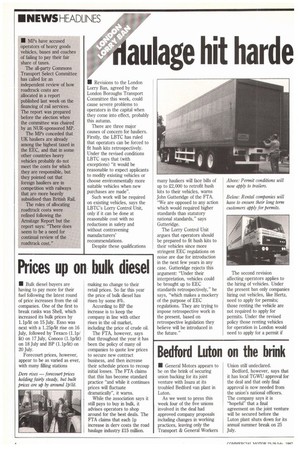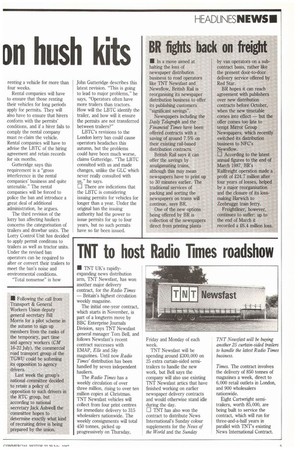aulage hit harde on hush kits
Page 6

Page 7

If you've noticed an error in this article please click here to report it so we can fix it.
• Revisions to the London Lorry Ban, agreed by the London Boroughs Transport Committee this week, could cause severe problems to operators in the capital when they come into effect, probably this autumn.
There are three major causes of concern for hauliers. Firstly, the LBTC has ruled that operators can be forced to fit hush kits retrospectively. Under the revised conditions LBTC says that (with exceptions) "it would be reasonable to expect applicants to modify existing vehicles or choose environmentally more suitable vehicles when new purchases are made".
Such work will be required on existing vehicles, says the LBTC's Lorry Control Unit, only if it can be done at reasonable cost with no reductions in safety and without contravening manufacturers' recommendations.
Despite these qualifications many hauliers will face bills of up to 22,000 to retrofit hush kits to their vehicles, warns John Gutteridge of the FTA. "We are opposed to any action which would required higher standards than statutory national standards," says Gutteridge.
The Lorry Control Unit argues that operators should be prepared to fit hush kits to their vehicles since more stringent EEC regulations on noise are due for introduction in the next few years in any case. Gutteridge rejects this argument: "Under their interpretation, vehicles could be brought up to EEC standards retrospectively," he says, "which makes a mockery of the purpose of EEC regulations. They are trying to impose retrospective work in the present, based on retrospective legislation they believe will be introduced in the future."
The second revision affecting operators applies to the hiring of vehicles. Under the present ban only companies hiring out vehicles, like Hertz, need to apply for permits; those renting the vehicle are not required to apply for permits. Under the revised policy those renting vehicles for operation in London would need to apply for a permit if renting a vehicle for more than four weeks.
Rental companies will have to ensure that those renting their vehicles for long periods apply for permits. They will also have to ensure that hirers conform with the permits' conditions, and if a hirer fails to comply the rental company must re-claim the vehicle. Rental companies will have to advise the LBTC of the hiring agreement and retain records for six months.
Gutteridge says this requirement is a "gross interference in the rental companies' business and quite untenable." The rental companies will be forced to police the ban and introduce a great deal of additional administration, he argues.
The third revision of the lorry ban affecting hauliers concerns the categorisation of trailers and drawbar units, The Lorry Control Unit has decided to apply permit conditons to trailers as well as tractor units. Under the revised ban operators can be required to alter or convert their trailers to meet the ban's noise and environmental conditions.
"Total nonsense" is how
John Gutteridge describes this latest revision. "This is going to lead to major problems," he says, "Operators often have more trailers than tractors. How will the LBTC identify the trailer, and how will it ensure the permits are not transferred between trailers?"
LBTCs revisions to the London lorry ban could cause operators headaches this autumn, but the problems could have been much worse, claims Gutteridge. "The LBTC consulted with us and made changes, unlike the GLC which never really consulted with us," he says.
There are indications that the LBTC is considering issuing permits for vehicles for longer than a year. Under the original ban the issuing authority had the power to issue permits for up to four years, but no such permits have so far been issued.




















































































